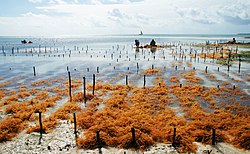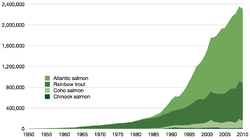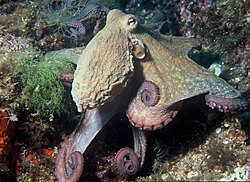range of microalgae species are produced in hatcheries and are used in a variety of ways for commercial purposes. Studies have estimated main factors in the...
30 KB (3,165 words) - 14:29, 21 July 2025
choice for production in a commercial setting. A range of microalgae species are produced in hatcheries and are used in a variety of ways for commercial...
23 KB (2,444 words) - 06:46, 4 July 2025
Seafood (redirect from Health benefits of eating seafood)
extent in modern times. Edible sea plants such as some seaweeds and microalgae are widely eaten as sea vegetables around the world, especially in Asia....
90 KB (7,286 words) - 04:38, 23 July 2025
Algaculture (redirect from List of algal culture collections)
of algae that are intentionally cultivated fall into the category of microalgae (also referred to as phytoplankton, microphytes, or planktonic algae)...
56 KB (8,582 words) - 21:20, 26 July 2025
Scallop aquaculture (section Hatcheries)
well as providing a regular supply of spat at a low price. While initial attempts to culture scallops in hatcheries were fraught with extremely low spawning...
24 KB (3,250 words) - 10:02, 29 December 2024
ammonia or silicates. Algaculture Culture of microalgae in hatcheries List of freshwater aquarium plant species List of marine aquarium plant species §...
14 KB (1,458 words) - 04:28, 27 May 2025
leading to an increase of EPS production of up to 34% (volumetric yield of 1.02 g/L. It was suggested that co-cultures of microalgae and other microorganisms...
62 KB (7,256 words) - 10:42, 21 July 2025
Mariculture (section Wastes from cage cultures)
self-supporting system. Seed for shellfish cultivation is typically produced in commercial hatcheries, or by the farmers themselves. Among shellfish types raised by...
39 KB (4,124 words) - 01:26, 6 July 2025
Salmon hatcheries are used in Europe, North America, and Japan to enhance wild populations. 1961: Hatchery raised Atlantic salmon fry were released in the...
93 KB (10,396 words) - 20:35, 28 June 2025
Bivalvia (redirect from Taxonomy of bivalves)
important source of bivalves for food. Modern knowledge of molluscan reproductive cycles has led to the development of hatcheries and new culture techniques...
122 KB (13,238 words) - 04:42, 14 June 2025
Ketura, Israel (category American-Jewish culture in Israel)
company in microalgae agriculture and one of the most forward-looking innovators in the field, worldwide. Ketura is part of the Green Kibbutz movement. In addition...
10 KB (1,006 words) - 20:41, 22 May 2025
Thalassiosira weissflogii (category Protists described in 1977)
in light intensity, temperature or day length. In aquaculture, Thalassiosira weissflogii is used to feed to shrimp and shellfish larvae in hatcheries...
8 KB (944 words) - 02:00, 9 February 2025
Humpback grouper (category Fish of Palau)
changes like water disturbances, or bright light. The culture tanks are also usually stocked with microalgae (such as Nannochoropsis oculata or Tetraselmis sp...
20 KB (2,284 words) - 18:11, 19 June 2025
Artemia, microalgae, or pellets is insufficient. These difficulties have limited the development of fully closed life cycle octopus hatchery systems. In 2021...
22 KB (2,368 words) - 22:17, 13 June 2025
develop successful hatchery technology for Apostichopus japonicus, prized for its high meat content and success in commercial hatcheries. A second species...
12 KB (1,456 words) - 09:38, 23 June 2023
feeding in aquaculture and raising of livestock and fur animals, in culture (e.g. fry, fingerlings or small adults for ongrowing), as bait, in pharmaceutical...
21 KB (2,488 words) - 17:25, 12 April 2025
Aquaculture (redirect from History of aquaculture)
of the hatcheries experiments with cod and lobster in 1890. By the 1920s, the American Fish Culture Company of Carolina, Rhode Island, founded in the 1870s...
132 KB (14,757 words) - 02:29, 2 August 2025
Isochrysis galbana (category High lipid content microalgae)
irishscientist.ie Marine microalgae as a source of w3 fatty acids Hobson, L. A.; Hartley, F. A.; Ketcham, D. E. (1979). "Effects of Variations in Daylength and Temperature...
4 KB (402 words) - 05:51, 1 April 2024
Geoduck aquaculture (section Collection of broodstock)
amount of microalgae to increase the temperature of the water. The higher temperature and abundant supply of microalgal feed induces spawning in males...
43 KB (4,564 words) - 05:58, 15 June 2025
November – Scientists report the development of a microalgae-based fish-free aquaculture feed with substantial gains in sustainability, performance, economic...
152 KB (27,278 words) - 16:38, 20 May 2025
Marine viruses (section In the water column)
most of them viruses of microalgae. The genomes of these marine protist viruses are highly diverse. Marine algae can be infected by viruses in the family...
91 KB (9,394 words) - 01:06, 11 July 2025
Hyalochlorella (category Taxa described in 1970)
from the parasite microalgae Prototheca. It also shows similarities to more recently described Ichthyosporea Sphaeroforma species, in particular Sphaeroforma...
7 KB (657 words) - 19:55, 22 May 2025
Cawthron Institute (category All Wikipedia articles written in New Zealand English)
long experience in algae research and the extraction of bioactive compounds, the Cawthron Institute Culture Collection of Microalgae and the new National...
32 KB (3,022 words) - 03:57, 17 May 2025
Fitzgerald, Devin S.; Nash, Hannah M.; Greenwood, Connor (12 November 2020). "Microalgae-blend tilapia feed eliminates fishmeal and fish oil, improves growth,...
189 KB (10,289 words) - 12:45, 1 August 2025




















